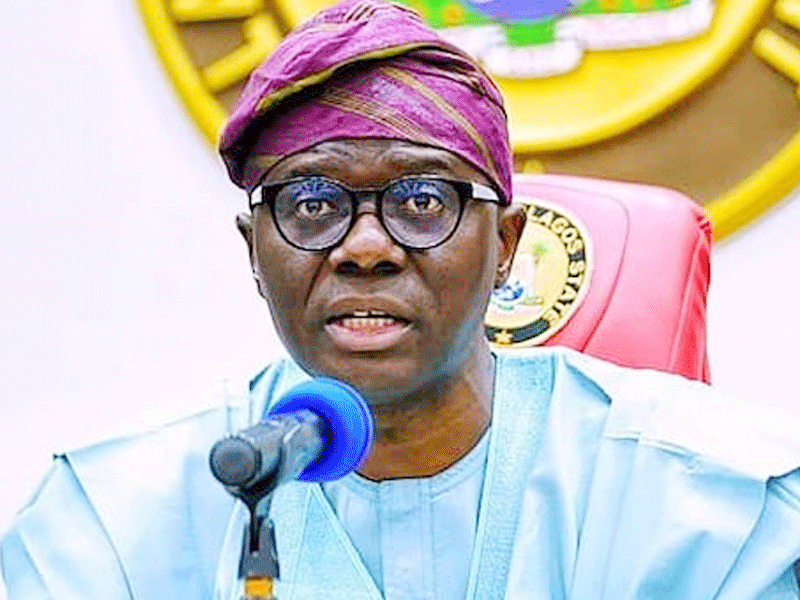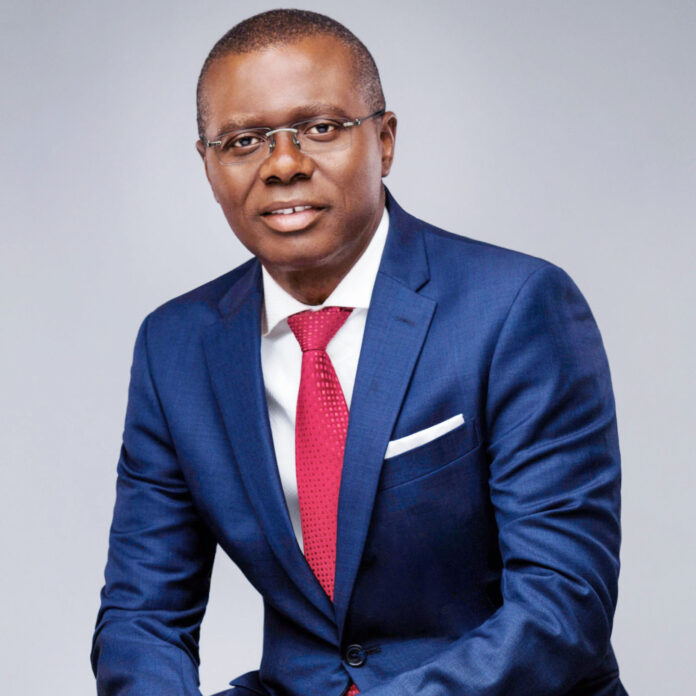By Ray Ekpu
When Mr Babajide Sanwo-Olu took the oath of office as the Governor of Lagos State on May 29, 2019, it was obvious to people who knew him that he was ripe and ready for it. He had acquired a Bachelor’s degree in Surveying and a Masters of Business Administration from the University of Lagos. He is also an alumnus of the London Business School, Lagos. Business School and the John F. Kennedy School of Government at Harvard University. After school he worked in the Lead Merchant Bank, United Bank for Africa and First Inland Bank, now called First City Monument Bank before joining the public service in 2003. In that year he was appointed as a Special Adviser on Corporate Matters to the then Deputy Governor of Lagos State, Mr Femi Pedro. He was later made the acting Commissioner for Economic Planning and Budget until 2007 when he was named as the Commissioner for Commerce and Industry by Governor Bola Tinubu. After the 2007 elections Sanwo-Olu was appointed Commissioner for Establishments, Training and Pensions by Governor Babatunde Fashola. The next Governor, Mr Akinwunmi Ambode also found him appointable and gave him the position of Managing Director and Chief Executive Officer of the Lagos State Development and Property Corporation (LSDPC) in 2016. The grooming that he went through in these offices prepared him for the position he now occupies.
It can be said without fear of contradiction that Lagos has, since 1999, scored very high marks in leadership recruitment. A huge portion of the credit must go to Asiwaju Bola Tinubu who has been the moving spirit in the selection of these achiever – governors. His gift in choosing good leaders is legendary. No one can take that away from him. All of them without exception were very passionate about and passionately committed to building Lagos into a city of remarkable exceptionalism.
Many Nigerian leaders are in the habit of promising that when they get into office they will hit the ground running. In many cases, they hit the ground and then they start crawling like a tortoise, not running like an antelope. Mr Sanwo-Olu showed right from day one that he will be different, that he was ready to live up to the high expectations of Lagosians. During his inaugural address he said: “The Babajide Sanwo-Olu you see today shall not change and try and become something I am not.” For starters, he chose to be addressed simply as “Mr Governor” and not “Your Excellency,” evidence that he is not enamoured of flamboyant titles. He wants, it appears, to demystify governance and dismantle the barricades pompously built around it. He wants to exude simplicity, not complexity in governance. He wants Lagosians to lose faith in titlemania, a disease that has eaten deep into the psyche of most Nigerians. In the same manner, he drives around Lagos without the ear-splitting pollution of sirens. He goes quietly to wherever he is going without making the earth to tremble from the impact of power on wheels.
On Thursday May 30, 2019 which was the second day of his tenure he and his Deputy Dr Kadiri Obafemi Hamzat stepped out at 8am on a road show to various offices. Their first ports of call were the Lands Bureau, Ministry of Physical Planning and Ministry of Environment. They interacted freely with civil servants amidst chants of Sanwo Eko, Sanow Eko by the enthusiastic civil servants. On that day the Governor signed the first executive order to address the issue of traffic control and management, fixing of potholes on the roads, sanitation and cleaning of drainages. He and his Deputy then went to Apapa to assure the people that they will tackle the traffic gridlock with vigour.
On his way back to Lagos House something happened. A danfo driver was driving against the traffic on Eko Bridge. He asked his convoy to stop and ordered that the vehicle should be impounded while the driver should be prosecuted.
On August 26 this year, the Governor showed not only his virtue of decisiveness but also his sense of compassion. During the crisis in Jos, Plateau State, in which several people were indiscriminately killed and maimed the Governor responded swiftly by sending a rescue team to Jos. The team supported by a security team brought back to Lagos 69 students who were either indigenes or residents of Lagos State. The students were exceedingly happy at being rescued from the jaws of the Plateau lions. He demonstrated that he understood as Charles Dickens said in David Copperfield that “procrastination is the thief of time.” Great leadership is epitomised by great problem-solving. Sanwo-Olu showed that he was capable of tackling an urgent, existential problem with great speed and humanitarian consideration.
Sanwo-Olu also appears to be a leader who understands the magic of symbolism. When he conducts official business on a Sunday he is teaching the people hard work. When he goes to an accident scene to see things for himself he is teaching the people the meaning of “management by moving about.” When he visits Dr Joe Odumakin on her husband’s death he is showing sympathy and empathy and telling the people that it is good to show compassion. When he gives an award to Mrs Celestina Kalu, the policewoman who raised money for the treatment of a robbery victim Friday Ojabor, he is commending her for her qualities of courage and compassion. When he inserts Lagos State in the Value Added Tax (VAT) issue or signs the bill on the anti-open grazing of cattle into law, he is telling the world that the interest of Lagos is not negotiable despite the risk involved. That is courage. He has shown in several ways that he is a take-charge, decisive and consensual leader. He is also engaging, warm and friendly which are all qualities of a good democrat.
Lagos is a mega city that is throbbing with a lot of energy and loads of economic migrants most of whom have little or nothing to offer the city. They are drawn to the city by the delusional thinking that since Lagos is said to be a land of possibilities jobs must be available for them. That is why Lagos unwillingly plays host to hoardes of okada riders, keke riders, job seekers without appropriate qualifications who come in and multiply the problems of this congested city. That makes the problem of urban renewal more complicated especially in areas of traffic, transportation, noise and waste management and the provision of amenities in all parts of the metropolis. These constitute a developmental nightmare for the government but there is no stopping the migrants because they perceive Lagos to be some kind of Eldorado, a shiny city on the hill.
It is obvious, however, that Sanwo-Olu is taking some impressive steps in bringing to reality the dream of a Greater Lagos. He has diversified the economy and reduced its dependence on oil revenue. He is investing in skilled manpower and taking the right steps to improve internally generated revenue. He is unlocking the potential of Lagos in the revenue raising department which has led to an astronomical increase in IGR. In 1999 its IGR was 14.6 billion, in 2007 it rose to 83.06 billion while in 2020 the figure had climbed to 48.99 billion. This is the product of economic diversification and the government’s readiness to embrace creativity as an article of faith. The Governor says that for his government technology is the new oil. The State Government is building the biggest technology hub in Africa to train start-ups that would develop technological solutions for the state’s advancement. Last year, the government supported start-ups with 250 million naira. Ethiopia and Rwanda are two outstanding countries in Africa that have used technology to improve their economy and the living standards of their people. Lagos is working towards transforming the metropolis into a smart city. The government says that in the next nine years every residence, school and office in Lagos would have access to fast internet connectivity. Right now 6000 kilometres of fibre metro network cables and broadband infrastructure are being laid across the state as part of the comprehensive smart city programme of the government. The broadband infrastructure rollout is to enable the people to achieve rapidity in commercial activities and provide instant access to healthcare, government services and social connectivity

Mr Sanwo-Olu’s performance in the management of the Covid-19 pandemic was an exhibition of quality leadership. Anywhere and everywhere he went to he wore his face mask showing that leadership is best practised than preached. Also, he did not hesitate in bringing to justice those, including so called celebrities, who violated the Covid-19 guidelines.
However, the most important challenge that the Governor had to face in the last two years was the EndSARS revolt which started peacefully but got hijacked by hoodlums. It turned into a regrettably bloody orgy of violence in which properties, government and private, were destroyed and many lives were lost in several parts of Lagos. Some critics have blamed Sanwo-Olu for inviting Army personnel to the Lekki Toll gate area which was the epicentre of the protest. I don’t believe it would have been a wise decision for the governor to allow hoodlums to bring Lagos to its knees without doing something to stop the mayhem. However, I believe the soldiers who were drafted to the scene ought to have been more restrained since the protesters at the Toll gate were peaceful, unarmed and flashing the national flag and singing the national anthem. However, much of the debate seems, unfortunately, to revolve around the word “massacre,” whether what happened at the toll gate was a massacre or not. The Dictionary of True Etymologies authored by Adrian Room says that “there is no connection between this word and “mass,” “massed” or “massive.” It says that the origin is in the old French (same word) with however the ultimate derivation uncertain. Perhaps it goes back eventually to an Arabic word meaning “shambles,” “slaughterhouse.” For me the argument about numbers killed is futile. Even if one unarmed and peaceful protester was killed in cold blood it is still a regrettable tragedy in a democracy where human rights ought to be protected. Mr Sanwo-Olu did what seemed right to him at the time in the face of the mayhem that was threatening to consume Lagos, but he had no control over the military men who went to the Lekki Toll gate. There was no basis for the appeasement of the hoodlums who even killed policemen and burnt police stations and public buses. What was needed was a humane approach to bringing it under control. When Winston Churchill was facing the tyranny of Adolph Hitler, Churchill said: “An appeaser is one who feeds a crocodile, hoping it will eat him last.”
Running Lagos is not a piece of cake. To run Lagos you need courage, audacity and creativity. No one is immune from facing crises. Sanwo-olu is not an exception. John F. Kennedy said something about the word “crisis” many years ago. He said: “when written in Chinese the word “crisis” is composed of two characters. One represents danger and the other represents opportunity.” The EndSARS crisis offers Lagos a gilded opportunity to milk goodwill out of the chaos of last October and improve the exceptionalism of Lagos.
Accidents do occur often in life, as it did when the uncompleted 21 storey building on Gerrard Road in Ikoyi collapsed a few weeks ago. Governor Sanwo-Olu visited the scene of the accident three times within three days. That is leadership at work. That is leadership on duty. That is a way of assuring the residents of Lagos that if they entrusted the management of the metropolis to him he will live up to their expectation. The recovery of trust must begin with the Peace Walk initiated by the Governor. There is no time to lose.



